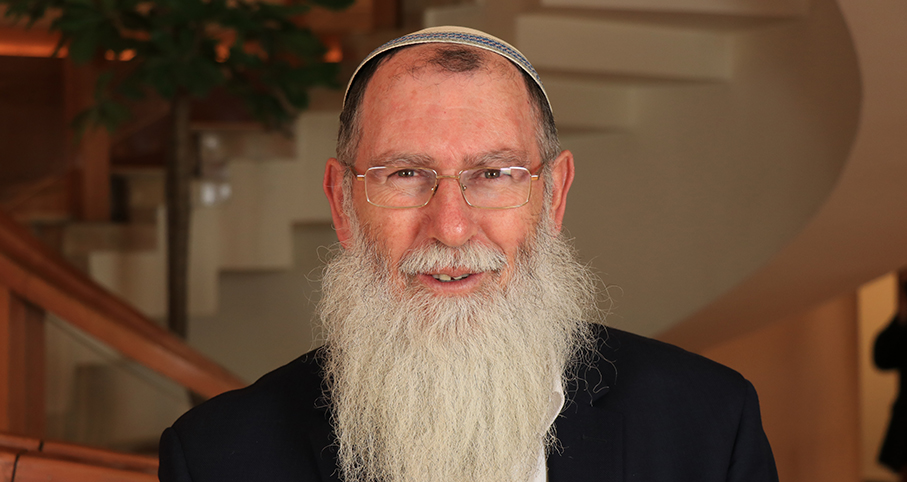Beit Midrash
- Sections
- Chemdat Yamim
- Ein Ayah
Gemara:
A favorite saying of Abayei was: A person should always be cunning in his fear of Hashem, respond softly and prevent anger, and speak in peace with his brothers and relatives and every person, including the idol worshipper in the market, so that he will be beloved Above and cherished below and be accepted by people.
An Intellectual Fear of Hashem
Ein Ayah: (based on Berachot 2:60)
"A person should always be cunning in his yirah (fear of Hashem)" - There is a difference between one who acts according to the form of fear of Hashem that the sechel (intellect) indicates and one who acts according to the power of dimayon (roughly, imagination) alone. In the first view, from the perspective of dimayon, fear of Hashem has to do with the fear of Hashem alone, and it has nothing to do with the ways of the world, mankind, and the dignity of human beings. Since the fear of Hashem fills his heart and all of his emotions, where will these human obligations find a place in his heart?
However, one who looks at yirah with his intellect will recognize that the purpose of yirah is to improve all of his paths in the most complete and pleasant manner and attract many to yirah, service of Hashem, and the path of the good. Therefore, one should not follow the form based on dimayon but based on the guidelines of the intellect in regards to the details of the fear. In so doing, he will realize that the great branches of true yirah are dignity of human beings, the ways of peace, and the way of the world. Then he will respond softly and prevent anger and speak in peace with his brothers and relatives and every person, including the idol worshipper in the market. Yirat Hashem will not bother him in so doing, nor will it take away from his ability to fulfill these human obligations, which is a crown of glory for a person and also serve to sanctify Hashem's name and spread the fear of Hashem in the world.
Regarding the idea of orma (cunning), which is built on wisdom, this has to do with the purity of the sechel without the outer coatings of dimayon. It is conceptually related to erom (naked), as the exteriors are removed. The tendency is that an intellectual form will immediately take on imaginary forms that will confound it and darken its beauty. Therefore, the wise of the heart will investigate the depths of the sechel and accept it with its purity without the coverings of dimayon until he is considered arum (with the person being called "arum b'yirah").
To Be Loved by Hashem and by Man
Ein Ayah: (based on Berachot 2:61)
Being "loved below" is not necessarily a praise. Sometimes a talmid chacham is loved by the people of his place because he does not rebuke them on religious matters. However, being loved Above comes from the essence of goodness and straightness. On the other hand, even in this world, the nature of the spirit cherishes good, even though good stands up against desires and therefore is not always loved, and a person sometimes hates the one who guides him to be good. However, this cherishing comes from a special internal recognition. This is found in one who straightens his path to go in the way of straightness with Hashem and people. He is fitting of being cherished, and in this way, everyone will get the feeling in their heart to want to follow his path and be like him. Although not everyone will actually end up following in the ways of goodness because of the power of the evil inclination, it is still a pleasant thing.

Various Rabbis
Various Rabbis including those of of Yeshivat Bet El, such as Rabbi Chaim Katz, Rabbi Binyamin Bamberger and Rabbi Yitzchak Greenblat and others.

Moreshet Shaul: A Crown and its Scepter – part II
Based on Siach Shaul, Pirkei Machshava V’Hadracha p. 294-5
Av 5785

A Husband’s Obligation in His Wife’s Loan
5775

Good and Evil Depend on the Actions
5777 Tammuz 22

Following the Majority When the Minority Is More Knowledgeable
5771

Focuses and as Part of a Congregation
Various Rabbis | 5770

If You're Not Part of the Solution- You're Part of the Problem
Ein Aya Shabbat 5,25
Rabbi Ari Shvat | Iyar 5783

"Rav Kook's 'Take' on the Current Turmoil in Israel"
Ein Aya Shabbat 5,22
Rabbi Ari Shvat | Iyar 5783





















